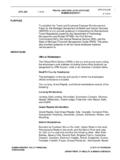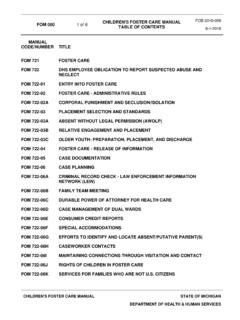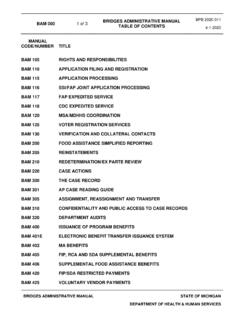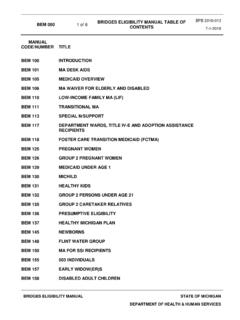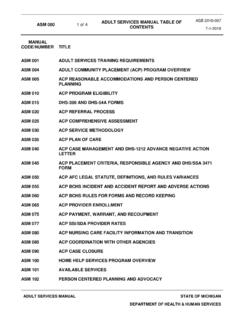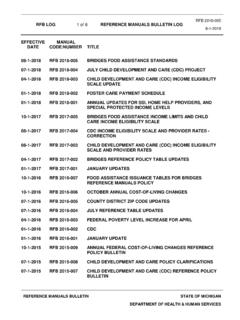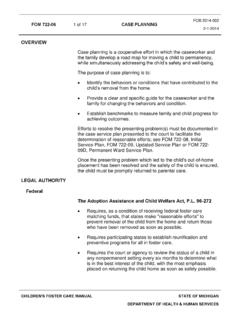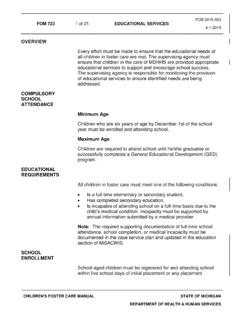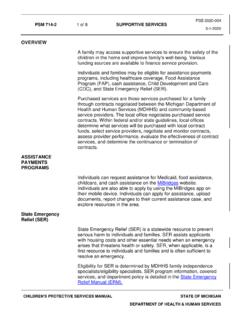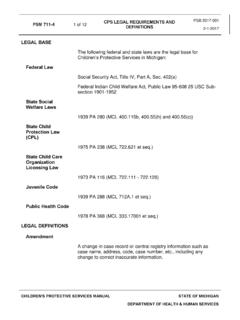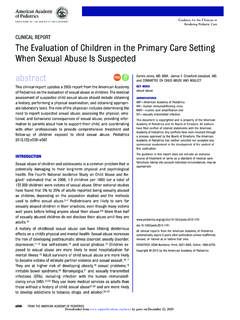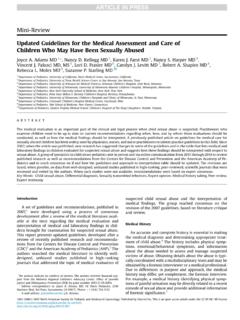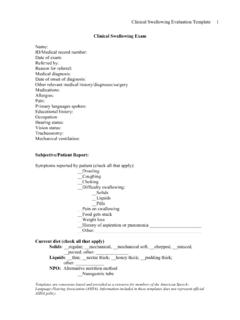Transcription of ADMINISTRATIVE RULES FOR CHILD PLACING AGENCIES …
1 FOB 2014-002. FOM 722-02 1 of 7 FOSTER CARE - ADMINISTRATIVE RULES . 2-1-2014. ADMINISTRATIVE . RULES FOR CHILD . PLACING AGENCIES . Policies and Procedures 1973 PA 116, CHILD Care Organization Licensing Act, as amended, provides for the protection of children through the licensing and reg- ulation of CHILD care organizations and for the establishment of stan- dards for CHILD care in the form of ADMINISTRATIVE RULES ; see FOM. 721 for legal citations. The following policies reflect and implement selected ADMINISTRATIVE RULES for CHILD PLACING AGENCIES . These are not ADMINISTRATIVE RULES but DHS policies designed to ensure compliance with RULES . Religion Services from CHILD PLACING AGENCIES are available to all children, regardless of the religious orientation of the CHILD or parent. The agency must not require a CHILD to attend church services or to fol- low specific religious training. The agency will attempt to fulfill parental wishes whenever possible, while taking into consideration the CHILD 's feelings and desires.
2 If there is disagreement between the parents and CHILD , parental wishes prevail. Foster parents/caregivers are expected to take into consideration the CHILD 's religious preference, especially when the CHILD has established a pattern of religious belief and practice. Foster parents/caregivers assume the responsibility for providing opportunities for religious education and attendance at religious services in accordance with the religious preference of the CHILD and/or parent(s). Children may not be refused the right to attend the church denomi- nation of their choice, unless there are specific safety concerns. A. decision that the CHILD may not attend a specific religious denomina- tion service must be approved by the county director or designee. Children may not be required to attend the church preferred by the foster parent/caregiver. CHILD PLACING AGENCIES may not impose their religious beliefs on children in their care.
3 CHILD PLACING AGENCIES must also ensure the foster parents/caregivers do not impose their beliefs or practices on the children in their home. (Rule ). CHILDREN'S FOSTER CARE MANUAL STATE OF MICHIGAN. DEPARTMENT OF HEALTH & HUMAN SERVICES. FOB 2014-002. FOM 722-02 2 of 7 FOSTER CARE - ADMINISTRATIVE RULES . 2-1-2014. Mail All children in the care of a CHILD PLACING agency are permitted to send and receive mail. The CHILD 's letters shall not be read by oth- ers, except where there is clear and convincing evidence to justify such action. If there is justification for opening a letter, the CHILD shall be present when the letter is opened. The caseworker must be available to the CHILD when mail with potentially distressing content is presented. (Rule ). Exception: Packages are exempt from the prohibition against inspection. Personal Possessions/. Allowances A CHILD has the right to have his/her personal possessions during placement in foster care and when leaving foster care.
4 The payment for family foster care includes an allowance portion for the CHILD placed there. See FOM 903-03, Payment For Foster Family Care, for detailed information on the intended handling of and use of the allowance. (Rule ). Placement of Siblings Siblings are entitled to be placed together when in foster care out- side their own family. If this proves impossible, the reasons are to be recorded in the DHS-65, Initial Service Plan (ISP), and/or subse- quent DHS-66, Updated Service Plan(s) (USP), as appropriate. Written second line supervisory approval is required for a placement which separates or maintains separation of siblings; see FOM 722-03, Placement of Sibling Groups. (Rule ). When lack of available bedroom space is the reason that the sib- lings are separated in foster care, see FOM 922-1, Foster Family Home Development, to determine the availability of a licensing vari- ance. When separated, the relationship between siblings must be main- tained by a detailed plan of visits, phone calls, and letters.
5 Visits must occur monthly. If a CHILD has been placed for adoption and his/her siblings remain in care, the adoptive parents should be encouraged to continue contact with the CHILD 's siblings. The visitation plan is to be recorded in the applicable service plan and CHILDREN'S FOSTER CARE MANUAL STATE OF MICHIGAN. DEPARTMENT OF HEALTH & HUMAN SERVICES. FOB 2014-002. FOM 722-02 3 of 7 FOSTER CARE - ADMINISTRATIVE RULES . 2-1-2014. the DHS-67, Parent-Agency Treatment Plan and Service Agreement. Placement Preparation Placement preparation must be consistent with all of the following: The CHILD 's age. The CHILD 's individual needs. The circumstances necessitating placement. Any special problems presented. The responsibility for documenting the necessity for a CHILD 's initial placement or replacement in foster care will rest with either the CPS worker or foster care worker, depending on who makes the placement.
6 CPS will be providing documentation in the Transfer to Foster Care Information Summary, for the first placement; see FOM. 722-01. Documentation of the preparation for a CHILD 's return home will typically be provided by the foster care worker. In some instances, CPS may also have this responsibility. Documentation of this information is to be included in required narrative reports, as appropriate. The SWSS FAJ-generated DHS-90, Placement Outline is used to document placement preparation. A notation of too young is not sufficient. Placement preparation is also preparing the foster parent/caregiver to meet the CHILD 's needs; therefore when a CHILD is too young to explain the move, placement preparation activities can include but are not limited to informing the foster parent/caregiver of the CHILD 's: Sleeping schedule. Formula and feeding schedule. Medical needs. See FOM 722-01, Children's Protective Services - Foster Care Transfer Summary Information, and FOM 722-03, Placement/Replacement.
7 (Rule ). Behavior Management CHILD PLACING AGENCIES must have a behavior management policy that identifies appropriate and specific methods of behavior man- agement. The methods of behavior management must be positive and consistent, based on each foster CHILD 's needs, stage of devel- CHILDREN'S FOSTER CARE MANUAL STATE OF MICHIGAN. DEPARTMENT OF HEALTH & HUMAN SERVICES. FOB 2014-002. FOM 722-02 4 of 7 FOSTER CARE - ADMINISTRATIVE RULES . 2-1-2014. opment and behavior. They must promote self-control, self-esteem and independence. (Rule ). The following types of punishment are prohibited: Physical force, excessive restraint, or any kind of punishment inflicted on the body, including spanking. Confinement in an area such as a closet or locked room. Withholding necessary food, clothing, rest, toilet use or entrance to the foster home. Mental or emotional cruelty. Verbal abuse, threats or derogatory remarks about the CHILD or his/her family.
8 Examples include but are not limited to the following: Academic progress. Behavior(s). Appearance. Denial of necessary educational, medical, counseling or social work services. Withholding of parental or sibling visitations. A foster parent/caregiver may use reasonable restraint to prevent a foster CHILD from harming himself or herself, other persons or prop- erty or to allow the CHILD to gain control of himself or herself. CHILD PLACING AGENCIES are to work with foster parents/caregivers and provide training to them which will encourage consistent and non-physical discipline practices for both foster and birth children. However, any local discipline policy developed to satisfy CHILD -plac- ing agency ADMINISTRATIVE RULES is to address discipline practices for foster children only. Local policy is not to be implemented which prohibits the foster parent/caregiver's use of reasonable physical discipline for either birth or adopted children.
9 Discipline and CHILD -handling techniques are to be recorded in the Parent-Agency Treatment Plan and Service Agreement, under Fos- ter Parent/Relative/Unrelated Caregiver Activities; see FOM 722- 08C. The techniques must be CHILD -specific and are to be consistent with the CHILD PLACING agency's behavior management policy. CHILDREN'S FOSTER CARE MANUAL STATE OF MICHIGAN. DEPARTMENT OF HEALTH & HUMAN SERVICES. FOB 2014-002. FOM 722-02 5 of 7 FOSTER CARE - ADMINISTRATIVE RULES . 2-1-2014. Education No later than five school days after placement of a CHILD in foster care, the CHILD PLACING agency or the foster parent/caregiver with agency approval, must enroll each CHILD of school age into a school program. (Rule ). The CHILD PLACING agency must notify the school administration, in writing, the name of the person who is supervising the CHILD 's foster care case and who is responsible for the care of the CHILD , using the DHS-714, School Enrollment Notification letter.
10 The DHS-713, Request for Report Card letter, is used to request a copy of the CHILD 's report card from the school. Both of these letters are generated from the SWSS FAJ Education module. The DHS- 3185, Placement/Education Record, is also generated from SWSS. FAJ. See FOM 722-11, Surrogate Parent for Educational Services, for information on special education services. School programs, whether public or private, must be accredited. If a CHILD is allowed to attend a private school, the school's philosophy must not be contrary to the CHILD 's or the family's beliefs, customs, culture, values and practices. Parental permission is required for a temporary court ward to attend private school. Medical/Dental Care The CHILD PLACING agency must ensure that each CHILD : Has a physical examination within 30 calendar days after initial foster care placement. Receives a physical examination every 14 months. Has current immunizations.
